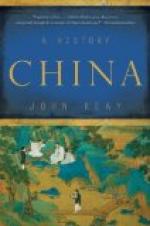In the provinces, the armies of the military prefectures gradually lost their importance when wars became longer and militiamen proved insufficient. Many of the soldiers here were convicts and exiles. It is interesting to note that the title of the commander of these armies, tu-tu, in the fourth century meant a commander in the church-Taoist organization; it was used by the Toba and from the seventh century on became widely accepted as title among the Uighurs, Tibetans, Sogdians, Turks and Khotanese.
When the prefectural armies and the militia forces weakened, special regional armies were created (from 678 on); this institution had existed among the Toba, but they had greatly reduced these armies after 500. The commanders of these new T’ang armies soon became more important than the civil administrators, because they commanded a number of districts making up a whole province. This assured a better functioning of the military machine, but put the governors-general in a position to pursue a policy of their own, even against the central government. In addition to this, the financial administration of their commands was put under them, whereas in the past it had been in the hands of the civil administration of the various provinces. The civil administration was also reorganized (see the table on pages 83-84).
Towards the end of the T’ang period the state secretariat was set up in two parts: it was in possession of all information about the economic and political affairs of the empire, and it made the actual decisions. Moreover, a number of technical departments had been created—in all, a system that might compare favourably with European systems of the eighteenth century. At the end of the T’ang period there was added to this system a section for economic affairs, working quite independently of it and directly under the emperor; it was staffed entirely with economic or financial experts, while for the staffing of the other departments no special qualification was demanded besides the passing of the state examinations. In addition to these, at the end of the T’ang period a new department was in preparation, a sort of Privy Council, a mainly military organization, probably intended to control the generals (section 3 of the table on page 83), just as the state secretariat controlled the civil officials. The Privy Council became more and more important in the tenth century and especially in the Mongol epoch. Its absence in the early T’ang period gave the military governors much too great freedom, ultimately with baneful results.
At first, however, the reforms of A.D. 624 worked well. The administration showed energy, and taxes flowed in. In the middle of the eighth century the annual budget of the state included the following items: over a million tons of grain for the consumption of the capital and the palace and for salaries of civil and military officials; twenty-seven million pieces of textiles, also for the consumption of capital




